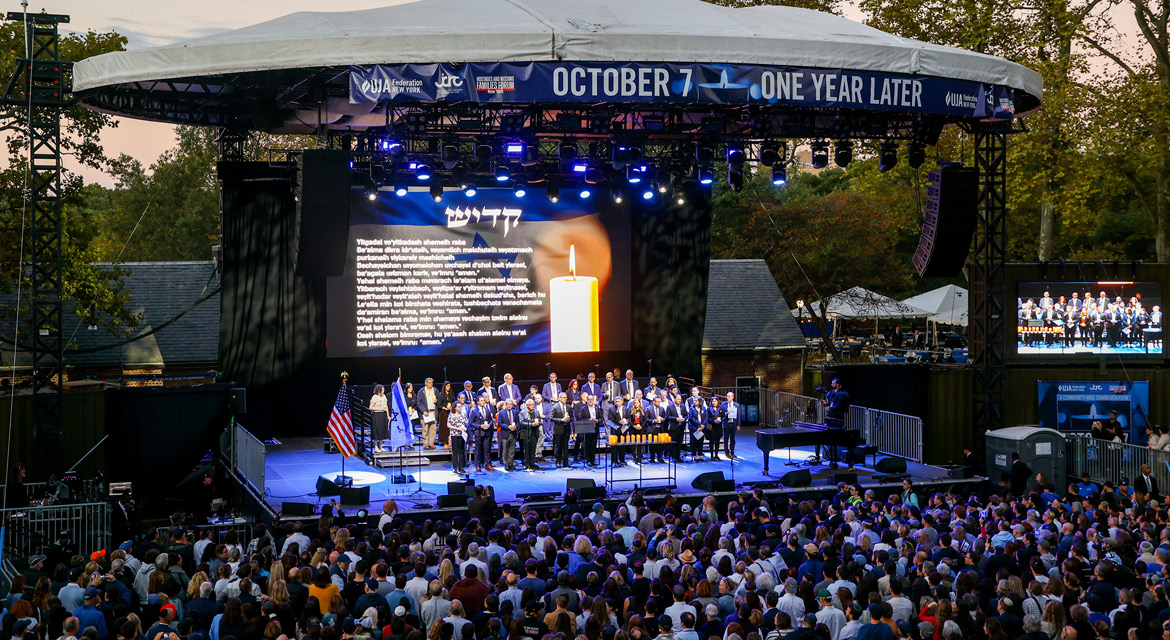The 10-day period between Rosh Hashanah and Yom Kippur that we’re in now is the most sacred of the Jewish calendar. Referred to in Hebrew as the Yamim Noraim — the “Days of Awe” — it’s a time for deep introspection, an opportunity for personal growth and resetting. But the root of the Hebrew word “noraim” can also mean dreadful, lending itself to an alternate name for this period, strikingly appropriate when the first-year anniversary of October 7 also falls within it — the Days of Dread.
And that is what this week brought by turns: Awe and dread.
I came to Israel this past Sunday, along with a group of senior UJA leaders, to commemorate October 7.
We attended many heart-wrenching memorials for the 1,200 Israelis killed and more than 250 abducted on that day, including two large ceremonies for the victims of the Nova music festival massacre: one in Tel Aviv on the evening of October 6, and another the morning of October 7 at the Nova festival site near the Gaza border. The program started at exactly 6:29 am — when the music stopped a year ago, and Hamas’s carnage began, killing 364 festivalgoers and kidnapping 40 more.
Many parents, keening in grief, wore T-shirts bearing the beautiful faces of their slain or abducted children. At the Nova site memorial, the program began with the last song played at the festival immediately before the massacre began, followed by a moment of silence. Then the shrieking cry of a mother tore through the quiet. Family member after family member told the stories of amazing people whose lives had been brutally cut short.
Because of UJA’s very significant support of the Nova victims and their families, I was asked to speak at both events on behalf of the diaspora Jewish community. I pledged our unwavering support and solidarity, reflected on the strong link between us that the events of the last year have only served to reinforce, and expressed our forever debt to the people of Israel for fighting and sacrificing on behalf of Jews everywhere.
Beyond the commemorations, we bore witness to the dread and trauma so many Israelis are carrying now. The most searing example was our meeting with Aviva Siegel at the Hostage and Missing Families Forum, a UJA grantee. Aviva and her husband, Keith, an American citizen born in North Carolina, were abducted from their home in Kfar Aza. She painstakingly described the horrific details of their captivity, including the starvation and abuse they and others endured. Aviva was released in late November, after 51 days. But Keith, to Aviva’s constant anguish, is still there. For so many in Israel, the roughly 100 hostages still being held in Gaza is an open wound, making it impossible to move past October 7.
Against this very considerable backdrop of dread and trauma, however, we witnessed much that generated awe — and left us very hopeful about Israel’s future. We visited an air force base and met Captain R, Israel’s first female F-15 fighter pilot, just 24 years old. Although she only began flying combat missions in late November, her commander told us that she’s logged more combat hours than many pilots who’ve retired after years of service, given the intensity and duration of the current conflict — the longest in Israel's history.
We also met M, a 25-year-old helicopter pilot who grew up on Kibbutz Be’eri; her great-grandfather was one of the kibbutz founders. M’s grandmother, a peace activist, could not be found after October 7, and the family had hoped that she was still alive, among those kidnapped to Gaza. A week later, her burned body was identified by DNA.
M told us that her grandmother’s murder only reinforced her resolve to defend the Jewish State. And she shared that her participation in the rescue of five hostages, including two children, was the best moment of her life. Like M, so many young Israelis radiate a sense of heroism and purpose — Israel’s “greatest generation.” To support them, we dedicated a new recreation center funded by UJA for the 118 Squadron, the helicopter unit involved in bringing some of the hostages home.
Over the week, we also met with many inspiring grantees who are working creatively to address major areas of need: trauma, rehabilitation of injured soldiers, rebuilding Gaza Envelope communities, restoring ruined land, and making sure the Tribe of Nova has a permanent space to gather — every one of them determined to carry Israel forward, their sense of purpose a balm for the soul.
And then another unexpected moment of awe, looking outside my hotel window in Tel Aviv, I noticed more than a dozen cranes building new skyscrapers, in the middle of war.
As all this unfolded in Israel, we also supported memorials across New York City, Westchester, and Long Island, bringing together tens of thousands of people from every walk of Jewish life — along with non-Jewish allies. The largest event was held in Central Park, with an overflow of people gathering to watch the livestream at Temple Emanu-El.

